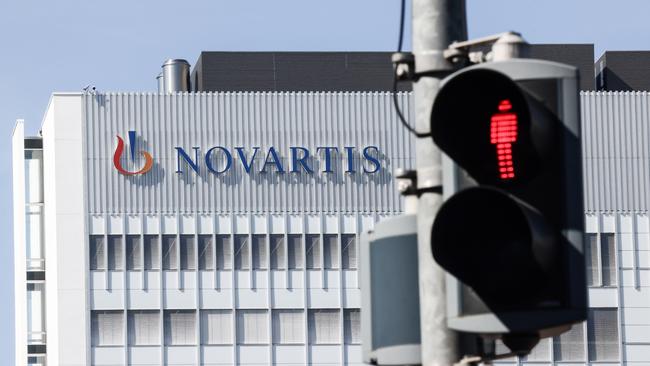Platinum says AstraZeneca, Novartis and Merck investments are good insurance in a market downturn
Platinum’s flagship international fund initiated positions in several pharmaceutical companies in the lead-up to Donald Trump’s ‘Liberation Day’.

Platinum Asset Management’s flagship international fund initiated positions in several pharmaceutical companies in the lead-up to Donald Trump’s ‘Liberation Day’ which are deeply in the red as the US administration threatens to heap tariffs on the industry.
These holdings include UK-based AstraZeneca, Switzerland’s Novartis and US giants Merck and AbbVie, which were added to fortify the strategy and push into defensive stocks whose earnings are less dependent on the economic cycle.
AstraZeneca has tumbled 10 per cent since the start of April, Novartis is down 8 per cent over the same period, while Merck has fallen 12 per cent. AbbVie has lost 17 per cent of its value.
Ted Alexander, who joined Platinum in early March to lead Platinum International Fund taking over from former co-chief investment officers Andrew Clifford and Clay Smolinski, said he had dialled down the risk and rotated into pharma and consumer staples.
“We added about 15 per cent into defensives before the downturn,” Mr Alexander told The Australian.
Mr Alexander said healthcare stocks, which made up 9 per cent of the portfolio at the end of March versus just 1 per cent at the end of the December quarter, would “absolutely” serve investors well as defensive earners in a market downturn.
“The issue right now is we’re really not sure what the tariff outcome is going to be. There’s certainly an element of risk, but it’s a difficult (time in) markets because you just don’t have the clarity of what the long-term rules are going to be for trade,” he said.
“I still think they offer great opportunities. Looking at the long run, the pipeline of new drugs coming through looks pretty strong at the moment. There’s a lot of new medicines coming through that will meaningfully help people, and that’s what really drives the value in pharmaceuticals,” he said.

The fund reduced its positions in higher-risk financials which are sensitive to changes in the cost of borrowing.
Client outflows have plagued Platinum in recent years after its strategies suffered a lengthy period of underperformance, driven by an aversion to owning expensive US stocks.
Mr Alexander, previously chief investment officer at BML funds, joined Platinum on March 3. He was brought in to replace Mr Clifford and Mr Smolinski, who had run the fund together but were benched in February as the asset manager unveiled a new governance structure that would leave it without a CIO in favour of a committee providing investment oversight and guidance.
Mr Clifford is part of that committee, while Mr Smolinski is currently on sabbatical.
Mr Alexander’s plans for the international fund include seeking out non-consensus ideas and making sure Platinum doesn’t “run with the herd”.
Platinum International Fund was flat over the March quarter, outperforming its benchmark’s 2 per cent return. It has underperformed over one, three and five years.
Peer Magellan suffered a 2.2 loss in its flagship global fund over the same period, slightly better than its benchmark which also went backwards, by 2.4 per cent.
While Platinum’s Mr Alexander predicts the prospect of “much greater” sharemarket falls from here, particularly in the US, Magellan has taken a more positive view and sees “steady market returns” this year.
“In our base case economic scenario it’s unlikely that valuations will become significantly cheaper,” the fund manager co-founded by Hamish Douglass said in its latest quarterly update.
“We do not expect valuations to get as cheap as they were in the GFC or early stages of Covid for two reasons: First, the potential impacts of trade decoupling are much better understood by investors than a global financial crisis or global lockdowns. Second, Trump and other world leaders such as President Xi could reverse their actions that are creating economic uncertainty.”
Magellan’s base case is for a slowdown in the first half of this year followed by recovery as a stimulatory US budget is passed, European growth accelerates and trade frictions reduce following negotiations on tariffs.
That means investors look through the first-half slowdown, with market interest rates rising and unemployment remaining low.
“If the economic outlook deteriorates more than we expect, the portfolio’s quality and defensive biases will reduce drawdown capture, enabling our investors to sleep well at night,” Magellan said.
Elsewhere, Regal Partners last week told investors the sell-off and uncertainty in markets provided a good buying opportunity, as it revealed a 10 per cent loss in its ASX-listed Regal Investment Fund over the three months to March 31.
The slump was largely due to its holding in listed biotech Opthea, which it wrote down to zero following the failure of late-stage clinical trials.
CIO Phil King said the uncertainty surrounding Donald Trump’s tariff war would cause damage in the short-term but noted the resilience of the US economy, adding that the sell-off looked more similar to the Covid-19 shock in 2020 rather than the 2022 bear market.






To join the conversation, please log in. Don't have an account? Register
Join the conversation, you are commenting as Logout